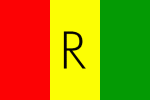
Rwanda
1962-2002
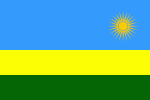
Rwanda
2002-Present
Quick reference
General issues: Republic 1962-Present
Country name on general issues: République Rwandaise, Rwanda
Currency: 1 Franc = 100 Centimes 1962-Present
Population: 2 924 000 in 1962, 12 337 000 in 2014
Political history Rwanda
Precolonial Rwanda
Rwanda is located in eastern Africa. The majority of the population is of the Hutu – a Bantu people. The minority is of the Tutsi – a people with a disputed origin: the Tutsi have long been considered to be of mixed Bantu and Nilo-Saharan origin, more recent insights suggest the Tutsi to be a Bantu people akin to the Hutu, differences being socially determined rather than ethnically. Although the minority, the Tutsi have, in the 19th century, attained the leading position as the royal family of the kingdom of Rwanda. The kingdom of Rwanda, in the second part of the 19th century, asserts itself over many of the smaller Hutu kingdoms that become tributaries to the kingdom of Rwanda. A small part – 1% – of the population is of the Twa – a people of Pygmy origin. he Pygmy were the original inhabitants of the country, Bantu peoples moved in at later dates.
Part of German East Africa
At the 1885 Berlin conference where the colonial powers divide their respective spheres of interest in Africa, Rwanda – then called Ruanda – is awarded to Germany. Ruanda is brought under effective German colonial administration, by 1897, as part of German East Africa. The borders with the neighboring countries – although subject of treaties from 1885 – are finally determined in 1910. The Germans have a limited presence in Ruanda and establish indirect rule of the district through the king of Ruanda. Coffee is introduced as a cash crop.
Belgian occupation and mandated territory
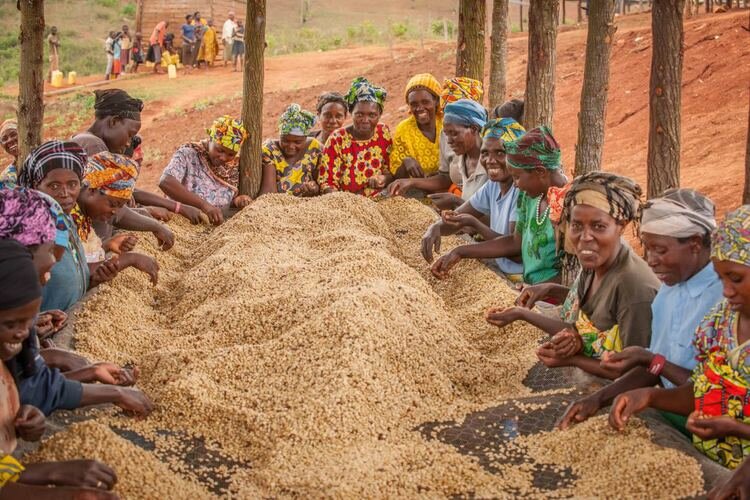
Women sorting dried coffee cherries to select the best quality. Coffee is the leading export product of Rwanda.
During WWI, German East Africa is, from 1916, occupied by mainly British and Belgian forces. Ruanda is occupied by the Belgians, and in 1919 becomes a Belgian mandated territory, part of what is then called Ruanda-Urundi. The extent of the mandate of Belgium is defined in 1922 by the League of Nations. In 1919, the borders have been defined as we know them until today – these borders differing slightly from the borders of the former district of Ruanda in German East Africa.
The Belgians administer the territory of Ruanda-Urundi, from 1925, as part of Belgian Congo. The Belgians enforce the position of the Tutsi upper class, thus deepening the rift between the Tutsi and the Hutu. In 1946, the mandate of Belgium is extended – Ruanda-Urundi becoming a United Nations trust territory. In the late 1950’s, Ruanda moves towards independence. The growing tensions between the Hutu and the Tutsi lead to a Hutu revolt in 1959 that is suppressed by the Belgians. By way of a referendum, the monarchy is abolished in 1961. Ruanda gains independence as the republic of Rwanda in 1962.
Independent Rwanda
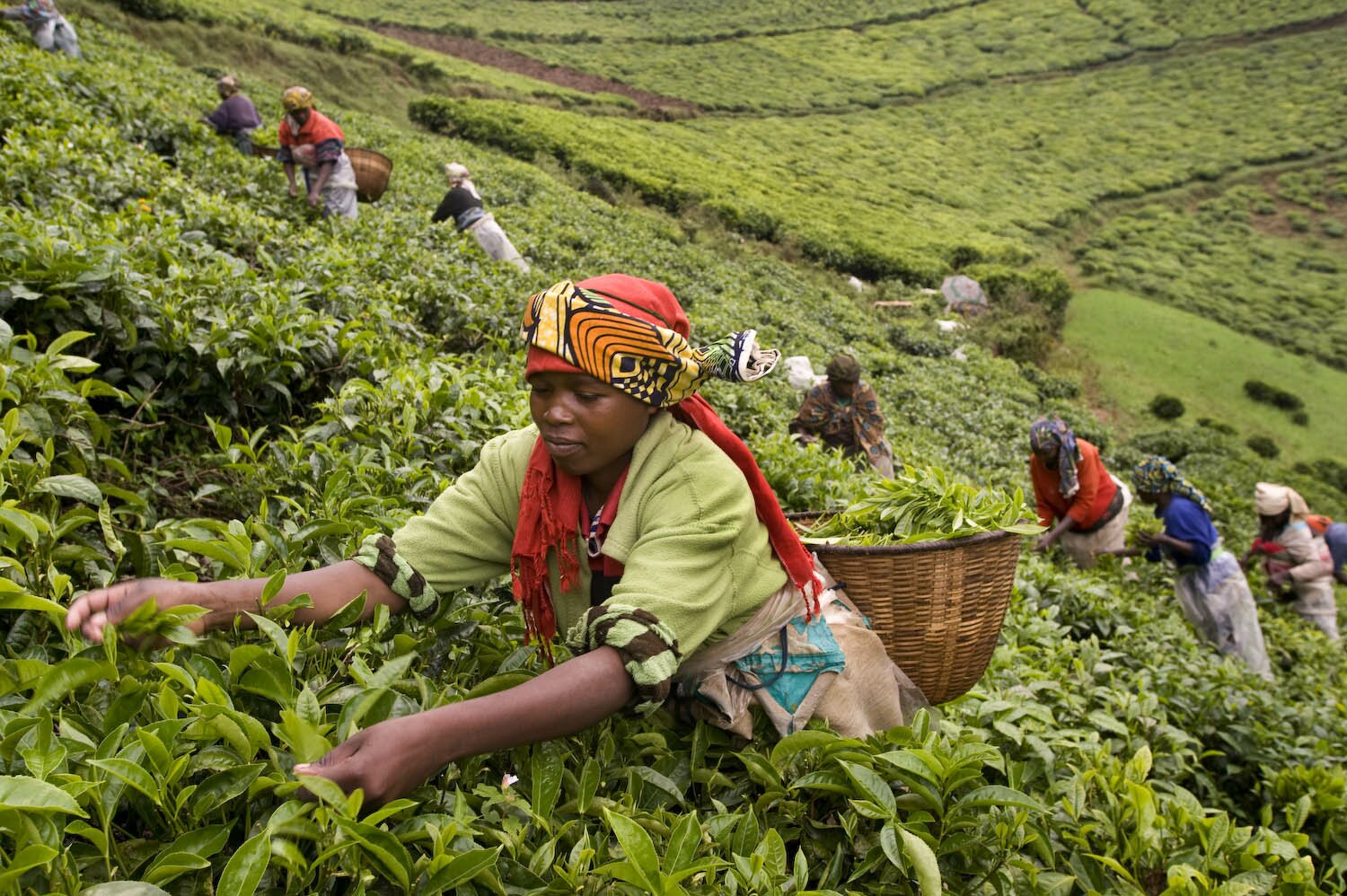
Women harvesting tea. Tea is, after coffee, the second most important export product of Rwanda.
The history of Rwanda, since independence, is defined by the conflict between the Hutu and the Tutsi. After the Tutsi royal family has been deposed, power, upon independence, is in the hands of the Hutu – Tutsi rebels based in neighboring countries being in armed opposition to the Hutu government. In 1973, a coup d’etat brings the military to power, in 1978 Rwanda becomes a one party state – a period of relative stability and economic development follows. In 1990, the Tutsi start the Rwanda civil war that is formally ended with 1993 peace accords. Large scale violence erupts again in 1994 – the Rwanda Genocide in which large numbers of Tutsi are killed by the Hutu. The Tutsi, nonetheless, gain the upper hand and by mid 1994 gain power. The Tutsi subsequently embark on a process of appeasement. The country seems to stabilize, and in 2003 elections are held. A Tutsi president is elected – and reelected in 2010. Although 90% of the Rwanda population is employed in subsistence agriculture, since 2003 the economy has shown significant recovery from the period of civil war. Coffee and tea are the main export products. Rwanda, in 2009, joined the British Commonwealth. Rwanda is one of the three members of the Commonwealth that has not been a British possession.[1]The other countries are Cameroon and Mozambique.
The conflict between the Hutu and the Tutsi is not limited to Rwanda. In 1993, civil war breaks out between the Hutu and the Tutsi in neighboring Burundi – a war that will last until 2005. In neighboring Congo, Hutu militias play an active part in the First and Second Congo civil wars between 1996 and 2002. Rwanda becomes part of this conflict as it tries to prevent incursions by Hutu militias into Rwanda.
Postal history Rwanda
The first stamps used in Rwanda are those of German East Africa. During the Belgian occupation, stamps are issued for the occupied territories in German East Africa from 1916. Also, in 1916, a local issue appears for use specifically in Ruanda. All occupation issues are overprints on stamps of Belgian Congo. The occupation issues will be used until 1924, when the first stamps are issued for the Belgian mandated territory of Ruanda-Urundi. Independent Rwanda issues stamps from 1962 – the first issue commemorating independence. The stamps issued, since independence, show a mix of themes of national interest and themes aimed at the thematic collectors market – with the exception of the period between the mid 1970’s to the mid 1980’s when stamps are issued almost exclusively for the thematic collectors market. In the late 1990’s, stamps have appeared on the market that are denounced by the Rwanda postal authorities.
Album pages
← Previous page: Ruanda-UrundiNext page: Saint Helena →

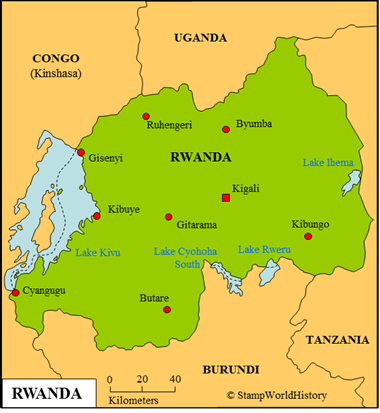

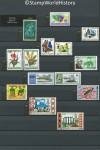
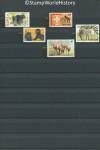
Gerben, the following information of Rwanda may be interesting for stampworldhistory: Rwanda is the member of Britisch commonwealth since 2009. Best regards Gedi
Gedi
Good to see back on SWH. Indeed an interesting fact, thanks for pointing out. I updated the profile.